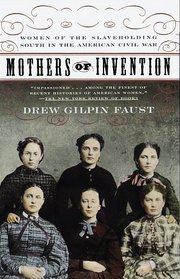This book gives a good overview of women's lives in the South during the Civil War. The author makes extensive use of diaries and letters of women in all social classes to show the affects of the war on women's lives. A must read for anyone interested in women's lives during the Civil War.
The book included thoughts from many southern women of the time. Many of them famous and a few mentioned were not as memorable. This account gives the reader a chance to see what was important to these women and their needs.
Excellent and very well-written research and scholarship. Says a few things that need to be said about the institution of slavery, and the true nature of the Confederacy.
First of all, set aside any "romantic" Scarlett O'Hara-style notions of Confederate ladies as spunky gals who would do anything to support their Boys in Grey, protect their children, and maintain their "way of life." Based on the fantastic array of letters, journals and other writing from every corner of the Confederacy, most of these women were whiny, pathetic and unbelievably lazy. Their social standing meant everything, and their social standing was based upon being weak and fragile "ladies," capable of doing nothing that could be described as real work.
That included looking after their own children. Lizzie Neblett, cited in the book's description as "a housewife facing a life of physical labor for the first time," is forced to look after her own children, when her slaves run away, and writes unapologetically about beating her 10-month-old daughter.
There were exceptions, of course, women who were prepared to risk social ostracism as nurses, joining the ranks of common women and slaves who were considered suitable for such lowly, "demeaning" work. Women who felt liberated by the disruption of the paternalistic system of the antebellum South, as they had to take responsibility for their lives for, perhaps, the first time. Women who began, however, haltingly, to recognize that the evil of slavery had brought them to this.
I have one (relatively minor) criticism: the subtitle, I think, could be misleading. The women Faust focuses on are the women of the slave-holding elite, whose who, in their own eyes, were the "aristocracy" of the South. Their attitude to ordinary, working class Southerners is very revealing of the con that this "masterclass" of slaveowners managed to perpetrate: pursuading those they considered their social inferiors to fight and die for a system that held them down.
First of all, set aside any "romantic" Scarlett O'Hara-style notions of Confederate ladies as spunky gals who would do anything to support their Boys in Grey, protect their children, and maintain their "way of life." Based on the fantastic array of letters, journals and other writing from every corner of the Confederacy, most of these women were whiny, pathetic and unbelievably lazy. Their social standing meant everything, and their social standing was based upon being weak and fragile "ladies," capable of doing nothing that could be described as real work.
That included looking after their own children. Lizzie Neblett, cited in the book's description as "a housewife facing a life of physical labor for the first time," is forced to look after her own children, when her slaves run away, and writes unapologetically about beating her 10-month-old daughter.
There were exceptions, of course, women who were prepared to risk social ostracism as nurses, joining the ranks of common women and slaves who were considered suitable for such lowly, "demeaning" work. Women who felt liberated by the disruption of the paternalistic system of the antebellum South, as they had to take responsibility for their lives for, perhaps, the first time. Women who began, however, haltingly, to recognize that the evil of slavery had brought them to this.
I have one (relatively minor) criticism: the subtitle, I think, could be misleading. The women Faust focuses on are the women of the slave-holding elite, whose who, in their own eyes, were the "aristocracy" of the South. Their attitude to ordinary, working class Southerners is very revealing of the con that this "masterclass" of slaveowners managed to perpetrate: pursuading those they considered their social inferiors to fight and die for a system that held them down.




